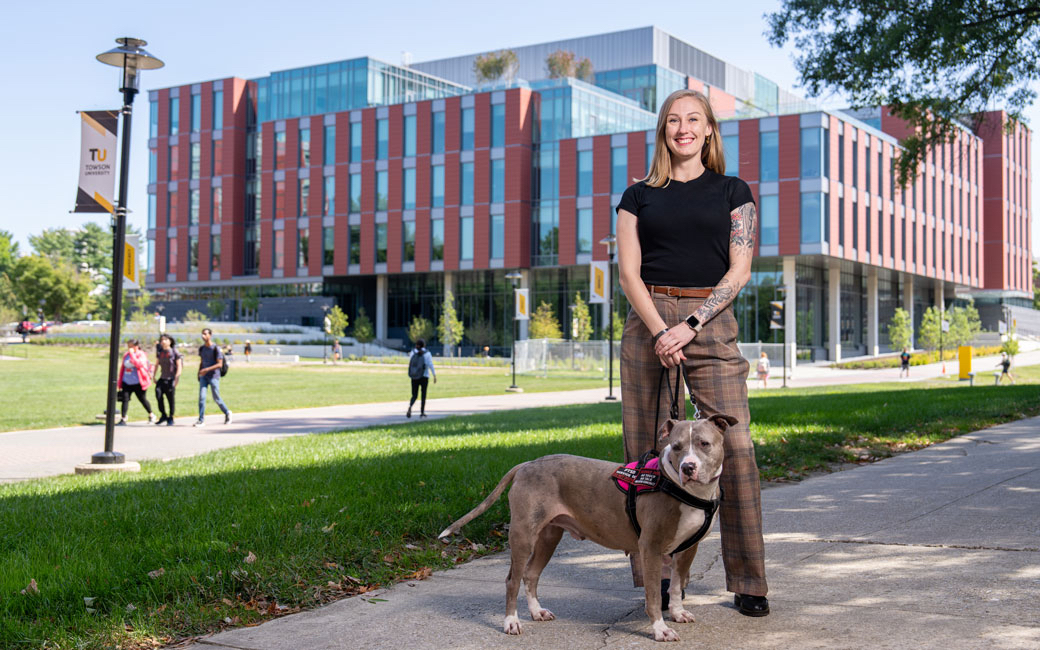July is Disability Pride Month—a time to acknowledge the struggles and celebrate the triumphs of individuals with disabilities. It also marks the anniversary of the Americans with Disabilities Act (ADA), passed on July 26, 1990. This landmark law guarantees equitable opportunities in employment, transportation, government services, and more. Thanks to the ADA, professions like audiology and speech-language pathology have been able to grow—grounded in the belief that people with disabilities deserve respect, equitable opportunities, and appreciation.
What Disability Pride Means to Me
As someone with an invisible disability, Disability Pride Month is both empowering and complicated. My service animal helps me manage post-traumatic stress disorder (PTSD), but because my disability isn’t always visible, I sometimes struggle with feeling “disabled enough.” Still, I’m proud of how far I’ve come, and I use my experience to educate others about the diversity that exists within the disability community and advocate for those whose challenges aren’t always seen.
My Experience in my AuD Program
As the first person in my doctor of audiology (AuD) program to have a service animal, I’ve experienced both meaningful support and significant challenges navigating clinical training and internship placements. Although my university has been incredibly accommodating, navigating some of the logistics was a learning process for all of us. It became clear that this was relatively new territory, and it highlighted opportunities to further align their strong commitment to inclusion with the needs of students who use service dogs. The unfortunate reality is that many internship sites are unsure how to work with a service animal—and even health care offices frequently violate ADA public access laws simply out of ignorance.
These experiences have shown me just how critical it is for speech, language, and hearing professionals, students, faculty, and governing boards to take an active role in disability advocacy. We must not only educate ourselves and others on disability rights but also commit to proactively implementing inclusive practices that empower disabled individuals—both as clients and as members of our professional community. For example, we shouldn’t wait until someone with a service animal actually has a need before we figure out the logistics behind that inclusive arrangement!
The Need for Structural Change
From universities to internship facilities and workplaces, it’s clear that programs must be designed to structurally accommodate individuals with disabilities. I’ve faced both support and obstacles during my graduate training—a reality that makes it even more critical for all environments to prepare and implement truly inclusive systems.
Why Disability Research Matters
Disability research is essential to our field because it informs respectful, effective, and evidence-based practices that center the real-world experiences of those we serve. Research challenges assumptions and brings visibility to issues like access gaps, stigma, and barriers in professional training. As someone navigating graduate school and clinical experiences with an invisible disability, I’ve witnessed how much misunderstanding still exists: Research helps us correct those gaps and build a more inclusive society where disability is not just accommodated—it’s understood and respected.
During Disability Pride Month, I want to highlight National NSSLHA members’ shared responsibility to deepen our understanding of disability and commit to inclusive practices in all aspects of our work. While we celebrate legal progress, we must also recognize ongoing gaps that remain to this day—and take action to improve our communities and professions.
More Resources:
Resisting Ableism in School-Based Speech-Language Therapy: An Invitation to Change
Explore how speech-language pathologists (SLPs) can recognize and reduce ableism in schools through inclusive, affirming practices.
For Disability Pride Month, First-Person Reflections on Disability Self-Advocacy
Read about those with communication-related disabilities as they describe how they’ve spoken up for themselves and other disabled people.
‘Be On Offense’: Changing Attitudes About Hearing Loss
Discover how one speaker turned communication barriers into a call for inclusion and empowerment.


I am profoundly proud to witness Tiffany Marsh’s exceptional advocacy for people with service animals, though it does not come as a surprise! As a fellow service member and having served alongside Tiffany, I have long admired Tiffany’s ability to surmount any obstacle, her unwavering dedication to advocating for others and embody the qualities of an exceptional role model. Her unwavering integrity and deep-seated commitment to justice will make her an extraordinary Audiologist!! Towson University is incredibly fortunate to have such a dedicated and principled student within its community!
Hey this Lee Tilmon Muldrew IV
Although I don’t have a gift for you I would like thank you for having a good heart
To Tiffany Marsh
This is Lee Tilmon Muldrew IV I should say
This is Lee Tilmon Muldrew IV
Although I don’t have a gift for you I would like to thank you for your good heart.
Stand strong.